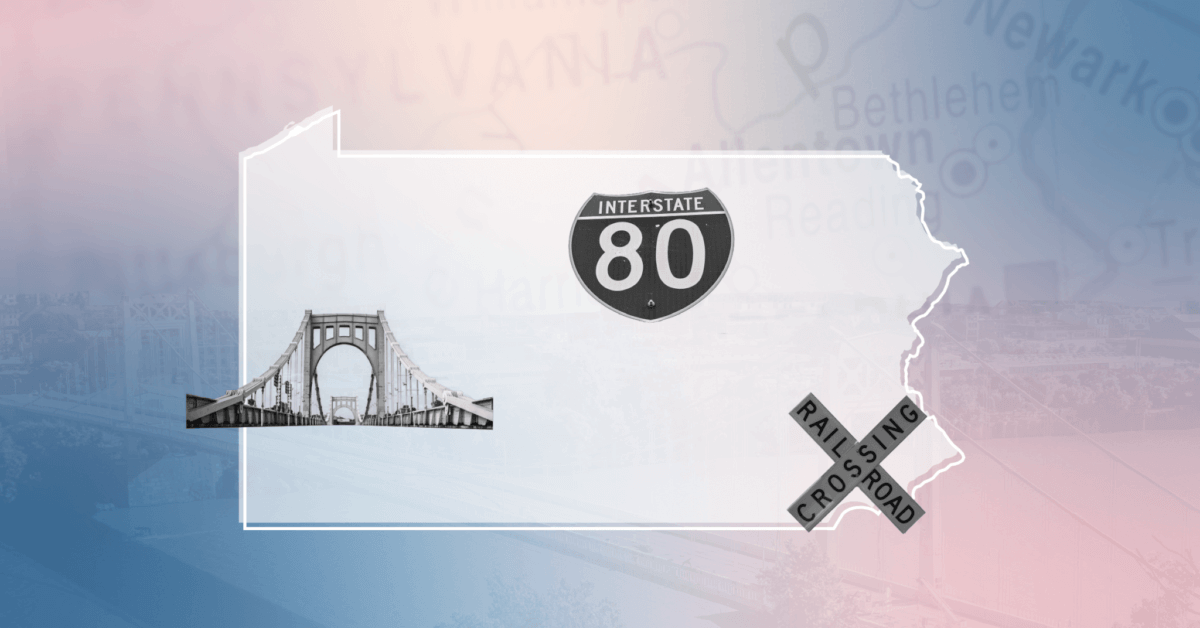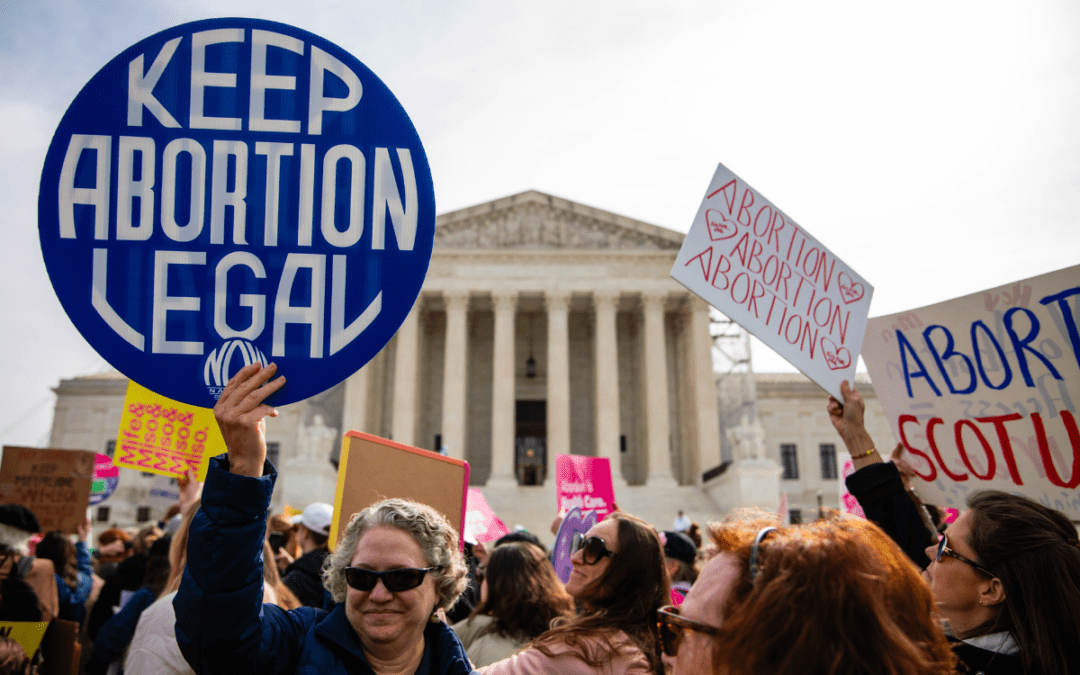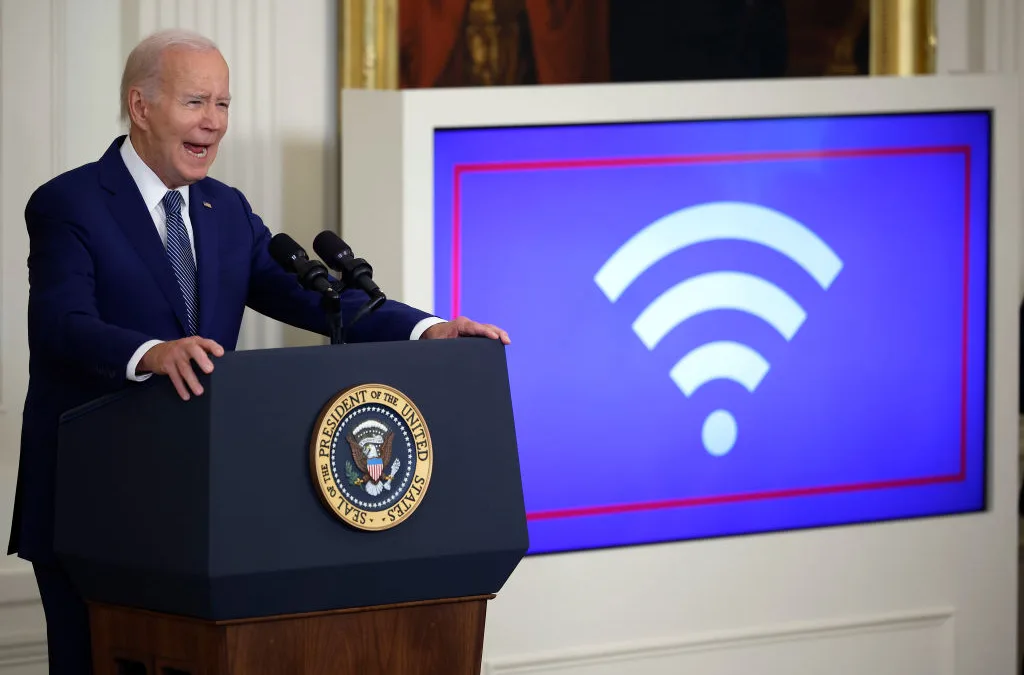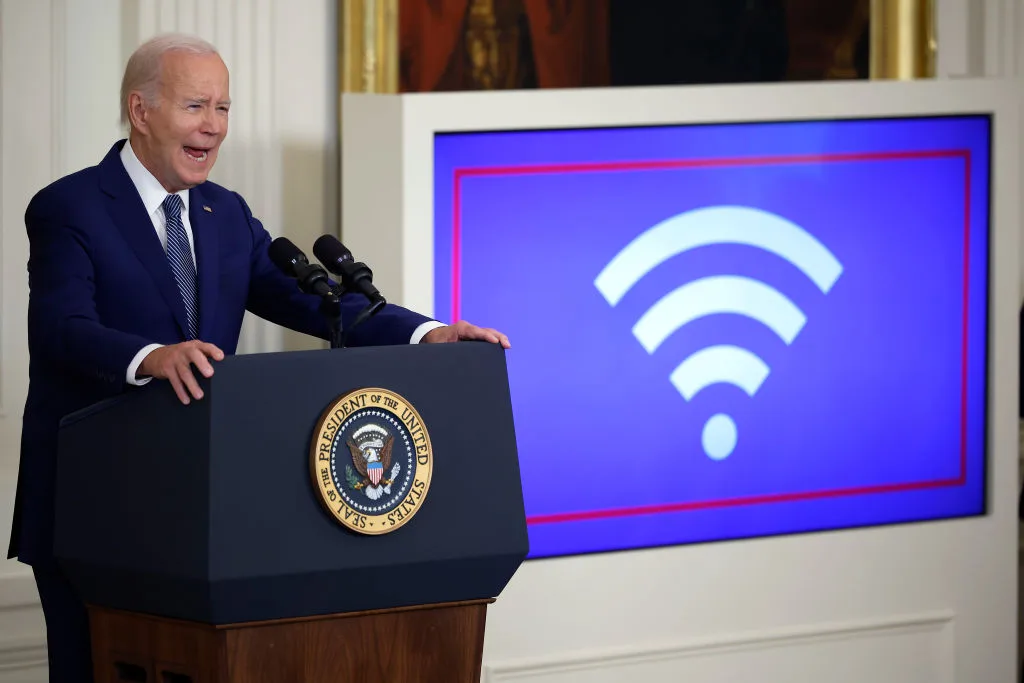
Graphic by Francesca Daly
In 2021, President Biden signed the historic $1 trillion infrastructure bill into law, delivering on a key piece of his economic agenda. Since then, billions of dollars have been funneled into all 50 states in order to upgrade highways, transit systems, water systems, and more.
In Pennsylvania, $8.1 billion in funding has been announced so far, and more is on the way. Here’s a look at the work that’s being done in the Keystone State and how it helps Pennsylvanians.
Roads, Bridges, and Public Transit
In Pennsylvania, there are 3353 bridges and over 7,540 miles of highway in poor condition. According to the White House, $13.2 billion in funding from the law has been allocated to Pennsylvania roads, bridges, roadway safety, and other major projects as of February.
A report released last year by TRIP, a national transportation research nonprofit, found that Pennsylvania’s rural roads and bridges are among some of the most deteriorated in the country. Of the top 20 states ranked in the report with the most decaying infrastructure, Pennsylvania ranked 13th.
Help is on the way, however. The Infrastructure Investment and Jobs Act included a $69 million investment for Pennsylvania through the Rural Surface Transportation Grant Program that “will support projects to improve and expand the surface transportation infrastructure in rural areas to increase connectivity, improve the safety and reliability of the movement of people and freight, and generate regional economic growth and improve quality of life,” according to the report.
As these roads and bridges improve, the average motorist will spend less in additional vehicle operating costs (VOC). These costs are a “result of driving on rough roads, the cost of lost time, and wasted fuel due to congestion, and the financial cost of traffic crashes.”
Clean Buses, Energy, and Power
The Bipartisan Infrastructure Law is also set to invest billions of dollars into clean public transit and school buses over the next five years. Half of that money will be used to replace existing school buses with zero-emission and low-emission models. Clean-energy buses reduce greenhouse gas emissions that drive climate change and will also reduce health risks among children and the surrounding communities.
To date, Pennsylvania has been awarded $34.6 million from the Environmental Protection Agency’s Clean School Bus Program, which provides school districts rebates to replace existing school buses with clean and zero-emission models to reduce harmful emissions from older buses. Nine communities in Pennsylvania received grants thanks to the program, including the Harrisburg City School District and the Scranton School District.
The Southeastern Pennsylvania Transportation Authority (SEPTA) was also awarded $23.4 million to improve bus service and clean transit buses through the Department of Transportation’s Low or No Emission Vehicle Program.
The infrastructure law is also set to upgrade the power infrastructure by “making the grid more resilient and building thousands of miles of new transmission lines to deliver clean, affordable electricity.” There’s additional funding to weatherize homes to improve their energy efficiency. This would lower energy costs for impacted households by an average of $372 per year, according to the Department of Energy.
Airports, Ports, and Waterways
To date, Pennsylvania has received approximately $120.4 million for replacing and modernizing airport infrastructure at airports, including those in Philadelphia, Pittsburgh, and Harrisburg.
According to the White House, this will help the United States become more competitive economically and create jobs. And as Airport World, the magazine of the Airports Council International, notes “ensuring that an airport has the necessary infrastructure to support the desired level of air service, including terminal facilities, runways, taxiways and air traffic control systems are crucial for being able to accommodate growth in passenger demand.”
The state’s ports and waterways are also in dire need of investment. Roughly $109.8 million has been allocated to Pennsylvania so far so that the state can address maintenance backlogs and reduce congestion and emissions near ports, such as the ones in Johnstown, Honesdale, and Wellsboro. Ultimately, this will help the US move goods more quickly, at a lower cost.
Water
There’s no arguing that clean drinking water is essential. The Bipartisan Infrastructure Law represents the largest investment in clean drinking water in American history, including the first-ever dedicated federal funding to replace lead service lines and address dangerous PFAS chemicals, according to the White House.
As of February, $240 million in funds have been allocated for Pennsylvania to provide residents with clean and safe drinking water. Of this funding, $87.3 million is set to be used for lead pipe and service line replacement.
According to the Perelman School of Medicine at the University of Pennsylvania, “there are hundreds of thousands of residential lead pipes still in use in Pennsylvania, especially in older neighborhoods where persons of color, seniors, or economically disadvantaged citizens often reside.”
Another $55.4 million will also go towards safe drinking water investments.
In Jan. 2023, the Environmental Protection Agency also announced a new initiative in Pennsylvania to accelerate progress toward the Biden administration’s goal of achieving 100% lead service line removal and replacement.
The Lead Service Line Replacement Accelerators “will provide targeted technical assistance services to help underserved communities in Pennsylvania access funds from President Biden’s Bipartisan Infrastructure Law and replace lead pipes that pose risks to the health of children and families.”
Internet
In the modern world, access to the internet is not only necessary, but crucial for Americans to be able to do their jobs, go to school, access health care, and stay connected with family and friends. Yet, nearly 21% of Pennsylvanians do not have an internet subscription. Under Biden’s infrastructure law, Pennsylvania will receive a minimum allocation of at least $100 million to help ensure high-speed internet coverage across the state.
Experts also estimate that as many as two million households in Pennsylvania are eligible for the Affordable Connectivity Program (ACP), although only 569,874 households are enrolled so far. This program cuts internet bills by up to $30 per month, or $75 for households on tribal lands. It also provides a one-time $100 discount off a connected device.
In addition to the above measures, the Biden-Harris administration is working with internet providers to offer high-speed internet plans that are fully covered by the ACP. This means that most eligible households in Pennsylvania would be able to get high-speed internet for free.
Electric Vehicles
Electric vehicles are quickly becoming a way of life for many Americans. While just 7% of U.S. adults say they currently own an electric or hybrid vehicle, according to the Pew Research Center, about 39% of Americans say that the next time they purchase a vehicle, they are at least somewhat likely to seriously consider electric.
The infrastructure law has so far allocated $61.9 million in 2022 and 2023 to build out a network of EV chargers across the state of Pennsylvania. Reducing gas emissions by transitioning to EVs is crucial to addressing the climate crisis, and that transition will create a crucial supply of new domestic manufacturing jobs, according to the White House.
Pennsylvania alone should expect to receive roughly $172 million over five years to support the expansion of electric vehicle charging.
Resilience and Legacy Pollution Cleanup
More broadly, one of the aims of the Bipartisan Infrastructure Bill is to address the climate crisis. Thousands of former industrial, chemical, and energy sites emit harmful pollutants into surrounding communities across the country and disproportionately impact communities of color.
The infrastructure law is set to reclaim abandoned mines, cap orphaned oil and gas wells, and clean up Superfund sites, which are areas that have been contaminated by hazardous waste being dumped, left out in the open, or otherwise improperly managed. As of February, 90 sites in Pennsylvania were listed on the Superfund National Priority List, including the Jackson Ceramix, Inc. Superfund Site in Falls Creek, which is receiving funding through the infrastructure bill.
To date, Pennsylvania has been allocated approximately $1.1 billion for improving “infrastructure resilience.” This investment will help the state work against pressing challenges like the impacts of climate change, extreme weather events, and more.
Politics

How Project 2025 aims to ban abortion in Pennsylvania
Former president Donald Trump said abortion was a state’s rights issue recently, but conservative organizations, under the banner “Project 2025,”...

736,000 PA households could lose crucial help on their internet bills
Time is running out for the Affordable Connectivity Program, which provides low-cost high speed internet access for over 736,000 Pennsylvania...

What to know about Trump’s legal issues
Over the past year, former president Donald Trump has become the center of not one, not two, not three, but four criminal investigations, at both...
Local News

Conjoined twins from Berks County die at age 62
Conjoined twins Lori and George Schappell, who pursued separate careers, interests and relationships during lives that defied medical expectations,...

Railroad agrees to $600 million settlement for fiery Ohio derailment, residents fear it’s not enough
Norfolk Southern has agreed to pay $600 million in a class-action lawsuit settlement for a fiery train derailment in February 2023 in eastern Ohio,...




